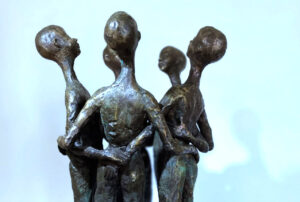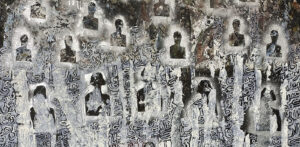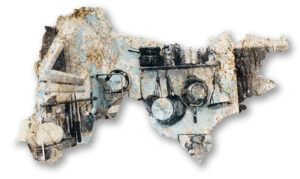Dear Souseh,
I have an old friend who is a flaming liberal. He is progressive on all the political issues we have ever discussed, except for Palestine. There, he has nuances, he argues that nothing is black and white, it’s “complicated.” This friend has been to Israel and Palestine many times. He has befriended a Palestinian family in Bethlehem, so he feels that he has his humanitarian bona fides. He even sends money to his friends in Bethlehem, because he can. But now with the war on Gaza, the onslaught, the ethnic cleansing, the starvation and yes, the genocide, we’re no longer speaking. Well, we haven’t properly spoken since last year, though we do continue to exchange messages about the ongoing horrors in Palestine. While this liberal Zionist bemoans the horrors befalling Gaza, and has even called what’s going on in the West Bank, “a creeping Nakba,” he says he still isn’t sure Israelis are committing genocide.
I explain that everything we see happening is the inevitable result of the fact that Israel is a settler-colonial project, that conquest, colonization, expulsion and murder are in its very DNA, but it’s like talking to someone who is deaf and dumb, for he has friends and family in Israel, and he does not believe that Israel is, in fact, a settler-colonial state. He also denies that Israel practices apartheid, because it is a real democracy — messy, imperfect, but a democracy. My argument is that if you’re silent on the genocide, you’re complicit. If you say nothing, you’re doing exactly what millions of Germans did while the fascists ruined their country, conquered their neighbors, and set up the world’s first industrial genocide. He also fails to see that Israel is the Goliath, the nonstop bully of the Middle East, having bombed several of its neighbors (especially Lebanon, Syria, Iraq and Iran) repeatedly, with impunity. So I guess the question I’m asking is, why do I continue to bother reaching out to this friend, when he seems so obtuse, so unwilling to open his own mind to the horrors being committed by the Israelis? “Genocide? I still can’t decide.” He says this despite the fact that several international human rights NGOs, the UN and the International Criminal Court have weighed in, and decided.
Why do I bother? To tell you the truth, I feel that our inability to communicate and indeed, to continue being friends, is due to a breakdown in communication — a total failure to have a civil discourse and agree to disagree. To be even more blunt, I’ve come to feel that this person I once respected is not that intelligent. He can’t understand what is happening before the eyes of the world, and not just since October 7, 2023. In my view and in the opinion of many, Israel has never stopped “the creeping Nakba,” and it’s only going to get worse. Why, I wonder, does it still bother me that this old friend and I are unable to speak to one another?
Champion of Lost Causes
Dear Champion of Lost Causes,
As I read through the set-up of your query, I kept trying to anticipate the actual question. I was almost certain it would go something like: How can this friend and I reconcile? Or, How can I find a way to talk to or convince him?
Instead, I was relieved to see you ask two entirely other questions. First, Why do I continue to bother reaching out to this friend? And, Why does it still bother me that this old friend and I are unable to speak to one another?
I was relieved because neither of your questions require any contortions on my part, the attempt to perform some overture toward the idea that a reconciliation might be possible, or that there is some resolution or conversation to be had. Instead, you seem only to want some further insight into your own (not-so) mysterious reasons for continuing to reach out despite having mostly accepted the futility of the endeavor. And so.
Let me begin by affirming that your friend’s blinders on Israel are a phenomenon so trite and commonplace there’s an actual acronym for people like him: PEPs. Progressive except for Palestine. I prefer your term though: liberals. The people who, as the radical independent journalist I.F. Stone wrote, “only like the kinds of wars they… start themselves.” Incidentally, Stone, a Jewish American who traveled to Palestine with the Haganah on a reporting trip in 1946, came to advocate for what he called the “Other Zionism,” one that required “a recognition that two peoples — not one — occupy the same land and have the same rights.” His view of a binational state was so unpopular that his book, Underground to Palestine, was left to go out of print. It’s the perfect illustration of something your friend will no doubt deny. The fact that Israel has only ever made room for a single kind of Zionism: the kind that in turn makes room for only a single people to occupy the land, to have equal rights before the law. Thus, whether a Zionist adds the prefix of “liberal” to their ideology is no indication of their willingness to advocate for the existence of a free Palestinian enclave alongside the Jewish ethnostate of Israel, but rather the lies they are willing to tell themselves about what defending an ethnostate entails.
You lament the breakdown in communication between the two of you, the inability to “agree to disagree.” What does it mean, though, to “agree to disagree” about a genocide? Having done that preposterous thing, might you then set the entire subject aside and have some hot coffees or cold beers while you jaw about books or movies or whatever else interests you once had in common? How do you have a “civil discourse” while sitting amidst the smoking rubble, trying to speak of anything but? He might be able to ignore the shadowy movements at the peripheries of your conversations — the skinny father rising at the quiet of dawn to slip out and make for the killing fields cynically called “aid sites” before his children can wake and demand the unkeepable promise that he actually return — but can you? Everything in your letter says you cannot. Moreover and more importantly: you will not.
Are you able to extend your friend the empathy necessary to embrace his viewpoint? Let me make clear first what I personally believe about empathy. Extending it is not some selfless offering; it brings you something vitally important in return. By virtue of biology we are locked into a single body, with a single pair of eyes looking upon the world from a fixed vantage point of history and context and culture and of physical, material circumstance. What allows us to explore beyond the borders of that limited self? To have a bigger, fuller, more emotionally and creatively exciting and expanded life? It is that embodied imagination which we call empathy. The one that brings us to entire new ecosystems of feeling that we would have been otherwise not only unable to access, but of whose entire presence we would have remained unaware. It is an act, and thus requires effort, but it’s one that rewards that effort many times over.
Now, I have heard those debates about whether we owe people empathy or not, or whether attempting to understand an evil or amoral or cynical act is a form of excusing it. Let’s agree that the premise of the question, posed thus, is faulty. Neither empathy nor understanding are things owed; they are rather a grace we bestow upon ourselves in order to live more completely. Nor are they the same thing.
Trying to understand is important. It’s the way we make meaning. If we can’t situate something within some sort of scaffolding of meaning the whole structure might start to fall apart. We try to make the world coherent — and cohesive — so that we might move through it more easily. So, to take the example of your friend: you can certainly understand that he has loved ones in Israel who are far more real to him than the people whose homes and land and rights they’ve usurped. You can understand too that he and his loved ones all live in a place of fear, haunted by the thought that if those people whose homes and lands and rights have been usurped are given any freedom, any opportunity to demand justice, that it will come in a form that he and his loved ones and all the other usurpers will find unacceptable. You can understand all of that. So can I.
But empathy is different. It requires you to try and inhabit the body of his perspective in order to try and see through his history and his context, so that you might look upon the world through his eyes. And what might you see then? Might you see a people who stood through occupation, through siege, through the demolition of the entire landscape of the familiar, only now to be brought to their knees by the slow death of hunger, but feel deep down in yourself that they deserve all of this because it’s either them or the people you call your own? Might you think, oh, a shame, but actually they brought this upon themselves, and such is war? A shame, but this is the way it has to be if the people I love are to continue living in unobstructed comfort, and this is the price I’m willing to pay for it. Are you all right with seeing the world that way? Because that is what it requires to see the world through the eyes of someone like that. This is what’s so frightening about the liberal. There is no grotesque distortion of the truth when you look through their eyes. Instead, there is the truth in all its grotesquerie but also the ability to behold it calmly, steadfastly and think, well, that’s just the way it has to be. That’s the price I’m willing to pay for what I think of as “safety” or “democracy” or “civilization.” I’m willing to exact the bloodiest price from the bodies of others in order to preserve the sanctity of my own. There’s an argument to be made that it’s in fact dangerous to be friends with people like that. Because there’s a vertiginous horror in offering true empathy to them, in offering to stand side by side with them to stare out upon a blasted landscape and see, instead of seeing human beings forced into the worst bargains with survival imaginable, only a bloodless march of numbers. Numbers that add up neatly into not enough dead to constitute a genocide. Into a calculus I am willing to make.
I’m sure someone like your friend, reading this, would scoff. To him, it’s only the open fascist who ought to be shunned. These are the people who pin it all on “Netanyahu and his government.” Who are happy to outsource the ugly business of calibrating all the inequalities and indignities necessary to maintain an ethnostate to someone else. So that they might ascribe its inevitable results to someone else’s ill will, someone else’s irredeemable world view instead of seeing themselves as those who grant the monster permission to do what they themselves are too cowardly to own. This, it seems, is the democracy that Israel is. One in which the society votes in, time and again, the embodiments of its own worst impulses so that they might command the armies who murder and drive the bulldozers that smash and grant immunity to the settlers who burn down and raze while the nice liberals can shake their heads and say, this is not the Jewish state I envisioned. And yet, one might answer, you envisioned a Jewish state. That is, an ethnostate. On a land where others lived and live. What did you think the actual material action of building that Jewish state would entail? What price did you think it would exact from the soul of that state? Did you truly think it could ever end without mobs rioting for the right to rape? Without lawmakers and talking heads defending the right to rape the untermenschen whose bodies need to be obliterated in ways both physical and existential to make room for the chosen of the colony?
It has become clear to you now that it’s impossible for me to offer you “objective” advice here, or even pretend at “nuance” or offer the platitude that the decision to let this friendship go is “complicated.” For me as well, there is no compromise when it comes to genocide. As far as I see it, the decision to cut off this friendship entirely couldn’t be simpler, because it’s clear you lack the common ground, the common values necessary to maintain a real friendship. The emotional fallout, I’ll grant you however is extremely difficult. A difficulty proportionate to the longevity of the friendship.
Still, you were careful to ask: why does this loss bother me? I think what bothers you on a deeper level, more so than losing a friend — what bothers all of us who have been in similar situations to yours is this: if there are still so many otherwise intelligent, progressive people still stubbornly refusing to see things as they are; furthermore, if these are people to whom we have direct emotional lines, to whom we can make direct emotional appeals, who have been otherwise empathetic to us in various ways… if even these people cannot be convinced of Palestinian humanity, then what hope is there to convince anyone who might have the power to change things? How can your friend, anyone we might call friend, not see what we’re all seeing, which is everything you outlined in your letter?
The world still treats your friend’s perspective as sane and rational. But you don’t have to. My advice to you, Champion of Lost Causes, even though you asked not for advice but insight, is that there are some causes that should remain lost, and one of them is the liberal soul. It is a smoking husk of a thing, animating the ethically dead, and any kindling you expend trying to ignite it into full fellow feeling is kindling taken from your own moral store. Sometimes championing a lost cause makes us lose ourselves.
It bothers you that you can no longer talk to your friend because he is adrift, and drifting further, while you remain steadfast on a moral ground that doesn’t shift or quake or give way to the quicksand of justifying the unjustifiable. Keep hold of that, and let go your friend.
—Lina Mounzer, writing as Souseh



































